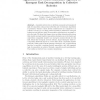Free Online Productivity Tools
i2Speak
i2Symbol
i2OCR
iTex2Img
iWeb2Print
iWeb2Shot
i2Type
iPdf2Split
iPdf2Merge
i2Bopomofo
i2Arabic
i2Style
i2Image
i2PDF
iLatex2Rtf
Sci2ools
137
click to vote
PPSN
2004
Springer
2004
Springer
A Neuroevolutionary Approach to Emergent Task Decomposition
A scalable architecture to facilitate emergent (self-organized) task decomposition using neural networks and evolutionary algorithms is presented. Various control system architectures are compared for a collective robotics (3 × 3 tiling pattern formation) task where emergent behaviours and effective task -decomposition techniques are necessary to solve the task. We show that bigger, more modular network architectures that exploit emergent task decomposition strategies can evolve faster and outperform comparably smaller non emergent neural networks for this task. Much like biological nervous systems, larger Emergent Task Decomposition Networks appear to evolve faster than comparable smaller networks. Unlike reinforcement learning techniques, only a global fitness function is specified, requiring limited supervision, and self-organized task decomposition is achieved through competition and specialization. The results are derived from computer simulations.
Distributed And Parallel Computing | Emergent Task Decomposition | PPSN 2004 | Task Decomposition | Task Decomposition Networks |
| Added | 02 Jul 2010 |
| Updated | 02 Jul 2010 |
| Type | Conference |
| Year | 2004 |
| Where | PPSN |
| Authors | Jekanthan Thangavelautham, Gabriele M. T. D'Eleuterio |
Comments (0)

